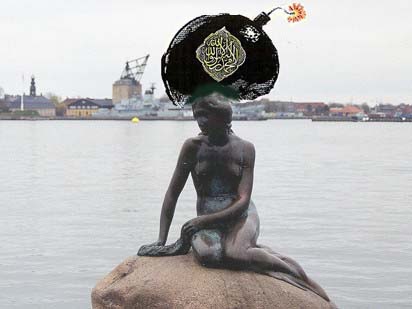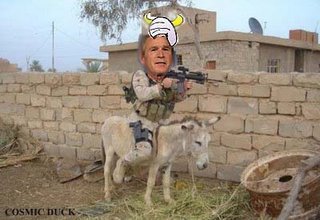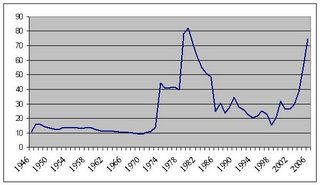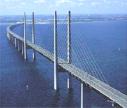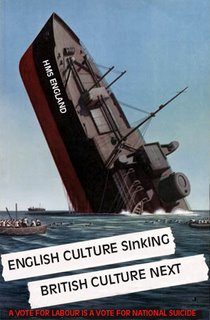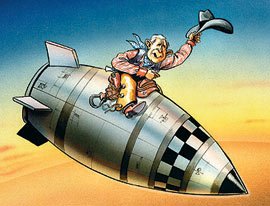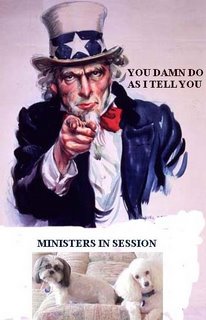 (Suddenly during Katrina crisis, they sprang to view, all the poor coloured people who had not previously got much exposition in the media. Left behind by the "American dream", and below the poverty line, they were so poor that they didn't even own a car to get away in. The middle and upper classes had left long ago)
(Suddenly during Katrina crisis, they sprang to view, all the poor coloured people who had not previously got much exposition in the media. Left behind by the "American dream", and below the poverty line, they were so poor that they didn't even own a car to get away in. The middle and upper classes had left long ago)
Very often the European social model and the American neoliberal model are compared. And it is generally assumed that the USA has a more advanced economy with a higher GDP pr capita and higher living standards. That is a questionable assumption.
According to the
worldbank's latest figures for 2004, the US GDP is 11667 bn $. As a European example, the Danish one is 243 bn $. Divided by population, 295 and 5,4 mio. respectively, you get a GDP per capita of US: 39.549, Denmark: 45.000. The Danish lead has increased since 2004 due to currency rate changes. A few European countries have higher GDP per capita than Denmark.
America is living above its means. Due to artificially low interest rates house prices have shot up and provided many American households with equity that makes it possible for them to finance overconsumption through loans. The effects can be seen in the balance of payments position (in the red at 6 per cent of GNP or some 7-800 bn $).
If one wants to compare the US with Denmark, one should look at incomes, - and income distribution. There’s no doubt that the US has a serious poverty problem. For in stance, one could read in the Boston Globe after the Katrina disaster:
“When ordering people to leave New Orleans while Hurricane Katrina lurked in the Gulf of Mexico, state and federal authorities apparently failed to consider that 27.9 percent of the city was below the poverty line and therefore unlikely to have transportation” (The Boston Globe). The official poverty line is about 20.000 $ for a four-member household.
Quote: “On
August 30,
2005, the U.S. Census Bureau published its poverty report for 2004. The official poverty rate rose from 12.5% in 2003 to 12.7% in 2004. This puts the number of people officially living in poverty in the U.S. at 37 million. For a family of 4 persons the threshold was listed as $19,307” (Census Bureau). That is considerably lower than a corresponding Danish family.
In the US a lot of workers make no more than the minimum pay, which at the national level is very low, much lower than in Denmark. Quote: “Workers who are covered by the FLSA are entitled to a
minimum wage of not less than $5.15 an hour” (US, Department of Labor). In France the minimum wage (Le SMIC) was about 8 euros an hour in the beginning of 2006, or considerably more than the American minimum wage. In Denmark the minimum wage is not fixed by law, but as the workers are highly unionised by collective agreement. It was about 14 $ an hour at the end of 2005. Taking income taxes into consideration, it is only slightly higher than the French level.
In the other end of the income scale incomes are very high. Quote: “The average CEO of a Standard & Poor's 500 company made $11.75 million in total compensation in 2005” (Paywatch.org). Income disparities have been widening as a consequence of the neoliberal economic order.
Of course, for a comparison, what is interesting is to look at average pay, and what you can get for that pay. According to most surveys, the average American wage earner/salaried employee made about 17 $ an hour in the beginning of 2005. Here it is noteworthy that taking inflation into consideration, average pay has barely budged since the beginning of the 1980s. The neoliberal model has led to sharpening competition in the labour market and outsourcing to low-income countries. And average wage earners are the losers in the income race compared to high income earners. And how much – or rather – how little do they get for the average income? Quote: “Meanwhile, those who secure the middle-class jobs of the 21st century will have to make $17 an hour stretch further than ever as they pay more for health care or risk doing without insurance and assume much or all of the burden for their retirement. Meanwhile, those who secure the middle-class jobs of the 21st century will have to make $17 an hour stretch further than ever as they pay more for health care or risk doing without insurance and assume much or all of the burden for their retirement” (Washington Post 31st of December 2004).
There’s a lot of talk about taxes in the European social model being so high. That is correct when you look at taxation on high income earners. When you look at middle or low income earners, the Nordic welfare model, for instance Denmark is not the area with the highest tax burden. Countries like Belgium, Germany in France are close to leading the race. In a publication from the Danish ministry of Taxation, “
Skattetryk en international Sammenligning, 2005, it is shown how several countries tax low and middle income earners more than Denmark does. The US is lower in this comparison than most EU countries, but for instance taking families with or without dependent children, the US is not so much lower that it compensates for the lower earnings plus the higher living costs to health care and other insurances.

